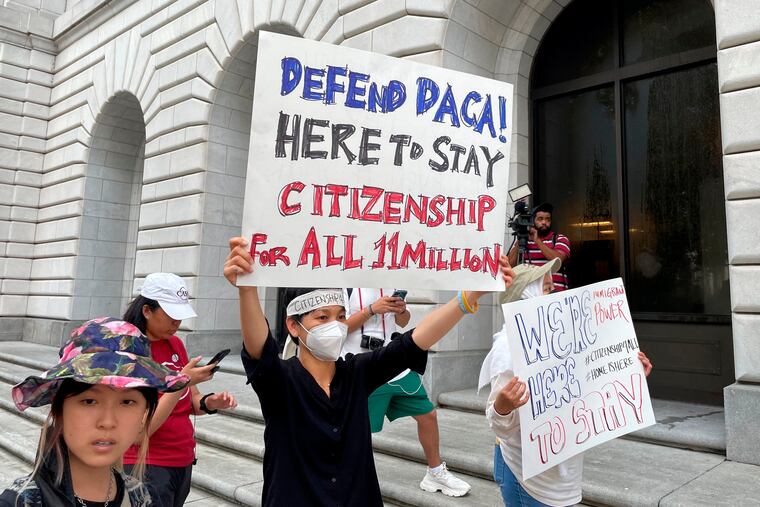Americans’ desire for more immigration drops amid world crises, new poll shows
The new data marks a return to a time when more Americans wanted immigration decreased

Only 27% of Americans want to see more immigration to the United States, a drop of seven points in two years, according to new Gallup polling that reveals deep divides over one of the central political, economic, and social issues of the day.
Fully 69% say admissions to this country should be cut or stay the same.
This at a time when employers are desperate to fill millions of empty jobs, governments are losing tax revenue amid an endless pandemic, and advocates cry out that crises around the world demand the United States reassert its leadership as a beacon of hope and welcome.
The poll results, from a survey of 1,013 adults from July 5 to 26, mark a return to a time when more Americans wanted immigration decreased, the analytics company said.
Views remain highly partisan, with the overall shift toward anti-immigration opinion driven by Republicans, among whom 69% said immigration should be decreased — up 21 points in two years. But the desire for less immigration has increased among other voters, too, up five points among independents to 33%, and four points among Democrats to 17%.
Overall, among all Americans, 27% say immigration should be increased, 31% would prefer it stay at current levels, and 38% want it decreased, Gallup found. The percentage of those who prefer less immigration is up 10 points since 2020.
The numbers arrive amid two of the biggest immigration events of the last 50 years, which landed back to back in a six-month span:
The chaotic, emergency air evacuation of 124,000 people as Afghanistan fell to the Taliban, among them 76,000 Afghan nationals who continue to be resettled across the United States. And the refugee crisis spurred by the Russian invasion of Ukraine, which has led 10.3 million people to flee the country. The United States continues to accept Ukrainians, and offered haven to up to 180,000.
At the same time, unprecedented levels of migrants are arriving at the U.S. southern border, challenging both the authorities on the line and the Biden administration in Washington, which has promised to create a more humane and orderly immigration system.
The partisan debate sparked by the border crisis has likely affected Americans’ overall views toward immigration, Gallup said.
U.S. Census figures show that international migration to the United States has plummeted, largely due to the COVID-19 pandemic, with about 247,000 people coming here between 2020 and 2021. That’s down from 477,000 newcomers between 2019 and 2020, and way down from recent peaks of 1 million in both 2015 and 2016.
Gallup’s question on immigration levels did not differentiate whether immigrants were arriving with or without permission, leaving that to respondents’ interpretation, the company said. Gallup noted that the figures among political parties were similar to the partisan levels of worry about “illegal immigration” when measured in March.
At that time, 18% of Democrats, 39% of independents and 68% of Republicans said they worried “a great deal” about undocumented immigration. In July, 15% of Republicans identified “illegal immigration” as the most important problem facing the country, compared to only 3% of independents and less than 1% of Democrats.
Americans’ overall support for more immigration hit an all-time high of 34% two years ago, fell to 33% in 2021, and dropped to 27% now. During the same period, the desire for decreased immigration has grown 10 points from its record low of 28%.
The preference for decreased immigration peaked at 65% in 1993 and 1995, a time, Gallup noted, when then-President Bill Clinton, a Democrat, was pushing for stronger border control and California Gov. Pete Wilson, a Republican, wanted to bar undocumented migrants from receiving public services.
By 2000 Americans’ desire for decreased immigration had dropped to 38%. The following year it surged to 58% in the immediate aftermath of the Sept. 11 terrorist attacks.
Perhaps oddly, given lack of desire for more immigration, seven in 10 Americans see immigration as a benefit to the U.S, the poll found.
That number, too, is driven by subgroups, with 83% of people ages 18 to 34 and 76% of those 35 to 54 being far more likely than those 55 and older, at 57%, to see immigration as a good thing. College graduates were more positive than those with no university education, and Democrats were nearly twice as likely as Republicans to say immigration was good for the country.